DM168 Fees Must Fall II
Meet the student fighters on the fiery fees frontlines
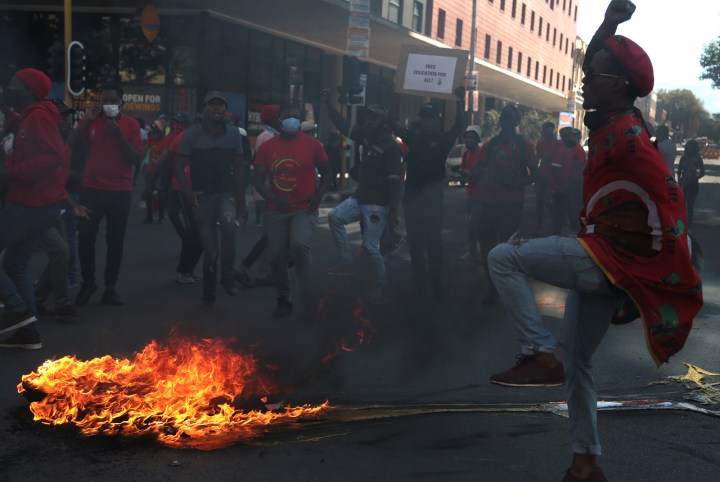
As protests over fee increases and exclusion continue, it’s not only about ‘striking’ or ‘disrupting’, says one student leader profiled here. It’s about making an impact on people’s lives and fighting to ease student woes, he says.
First published in the Daily Maverick 168 weekly newspaper.
Mpendulo Mfeka stands with students in front of Noswall Hall, his residence in Braamfontein.
As the president of the Wits SRC, Mfeka is leading hundreds of students at the University of the Witwatersrand to protest against financial exclusion.
Mfeka, who is studying for a postgraduate diploma in international economic law, calls himself a “slave to the cause” for free education.
“I didn’t choose to become an activist. Activism chose me,” he says.
Mfeka says his mother once told him that leaders are born. “Now, I am seeing the effect of this; you can’t make a leader,” he says. “Some of us unfortunately were born to be slaves and by slaves I mean in a good way and not in a bad way – to lead the cause and fight for our people.”
Experience has spurred Mfeka’s passion for activism. On his first day at Wits University in 2014, he could not register because of the upfront R9,300 registration fee required.
“I met a group of students protesting and they told me they were fighting against the same registration fee and if we won, we might be able to register,” Mfeka recalls.
He joined the protests. A few days later, the registration fee was scrapped by the university. “Ever since that year, I have been an activist,” he says.
Two years later, Mfeka was the chairperson of the South African Students Congress (Sasco) when the Fees Must Fall protests broke out in 2016.
“To a fair part, I can say that I was influenced by them,” he says, referring to the student leaders during the protests.
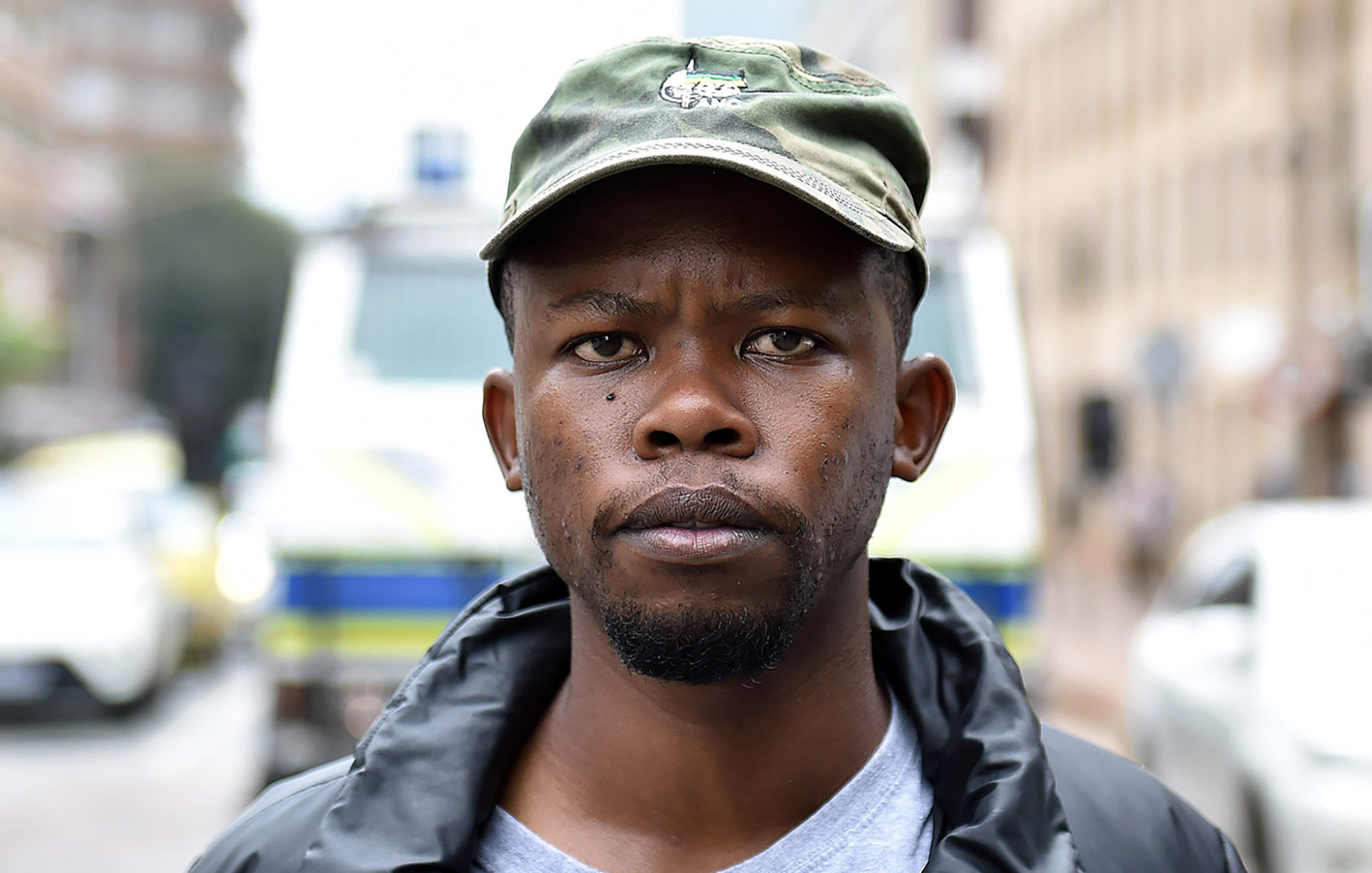
Wits University SRC President Mpendulo Mfeka spoke to Daily Maverick about the latest on the ongoing student protests. Photo:Supplied
Mfeka tells DM168 his political alliance is with the ANC, but adds that there are no external influences from the party in the way he leads the protest.
“There is no pressure or influence. I do this because it’s a true cause,” he notes. “If it means the ANC is the problem, I will call them out because I am a young person; I must not be afraid of making mistakes. So, if the ANC is making mistakes, I must call it out. If I don’t call it out, someone else will.”
Asked if there are divisions from other student groups affiliated to political parties during the protest, Mfeka says “every movement has its differences and if we deny this, then we are lying to ourselves”.
Mfeka adds that the Covid-19 pandemic has affected the momentum of the protests. “If not for it [Covid-19], we would have more students than we currently have,” he says.
As for when the protest would end, Mfeka says it might run for the whole year if “we don’t achieve what we want”.
“I have been threatened with expulsion, suspension and arrest, but this will never change my resolve,” he says. “I study at night and lead protests during the day for the good of everyone.”
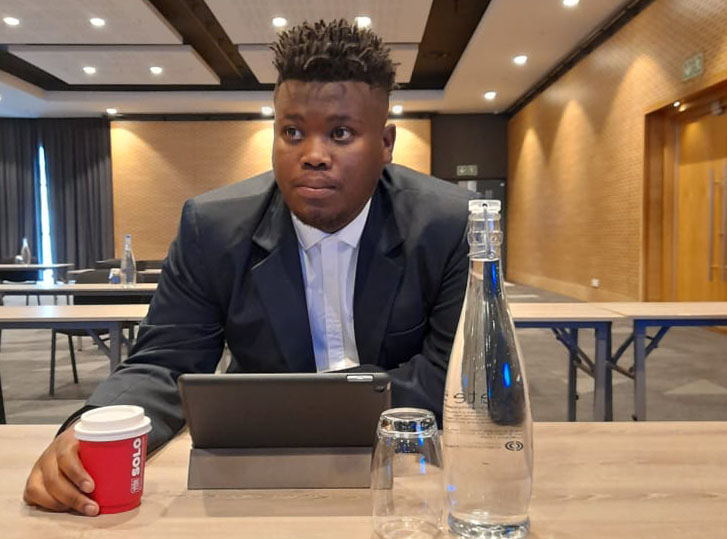
Thembalethu Nyikilana
Thembalethu Nyikilana
A discernment for justice, as well as not being afraid to speak up, was what brought Thembalethu Nyikilana to student politics and to the forefront of this most recent protest against rising fees.
Nyikilana is the student representative council (SRC) president at Nelson Mandela University (NMU) who believes he is called to play “an active role in bettering the lives around me”.
Nyikilana – affiliated with Sasco – led student protests at the university. Protesters barricaded the entrances to the University’s North and South campuses on 15 March. The action proved successful.
A joint statement by the SRC and NMU management, released on the day, said the university was mindful of the student funding challenges nationally and the impact the Covid-19 pandemic had had on students and agreed that the academic year would begin on 23 March.
There would also be “no academic exclusion” for the year 2021, said Nyikilana.
“This is a sector where you don’t need to be friends, but you need to be frank and upfront with each other, and meet each other halfway on some of the challenges being faced,” said Nyikilana.
He is slowly approaching the end of a “full-time job” that began towards the end of 2019, but was extended with the academic year due to the pandemic.
Nyikilana had seen this all before.
He was back at the picketing fence, calling for Fees Must Fall several years ago. “I was a junior in university but I did participate. We had one of the most gruesome protests during this generation,” Nyikilana said.
Yet, years later, the NMU student body and student leaders are sitting with the same issues.
NMU heeded the South African Union of Students (SAUS) call for a shutdown after the “tremendous” budget cut to the higher education sector as well as the cuts directly from the National Student Financial Aid Scheme (NSFAS), Nyikilana said.
This was an immediate reversal of the Fees Must Fall movement’s progress and achievements, he said. “The final nail in the coffin.”
But it did not come as a surprise. Financial pressures and academic exclusion were always on the table for the student leaders, Nyikilana said.
“We are in a very critical period that happens year-on-year during the registration period … For us, it is a matter of being there and responding to the challenges of our students.” He added that students understood that some of these complex issues were beyond university boundaries.
“These are national issues that require national commitment, as well as national decisions around it,” he said. “But it is not only the responsibility of the SRC [to fight]; this is an entire process that we as students need to walk together through, united.”
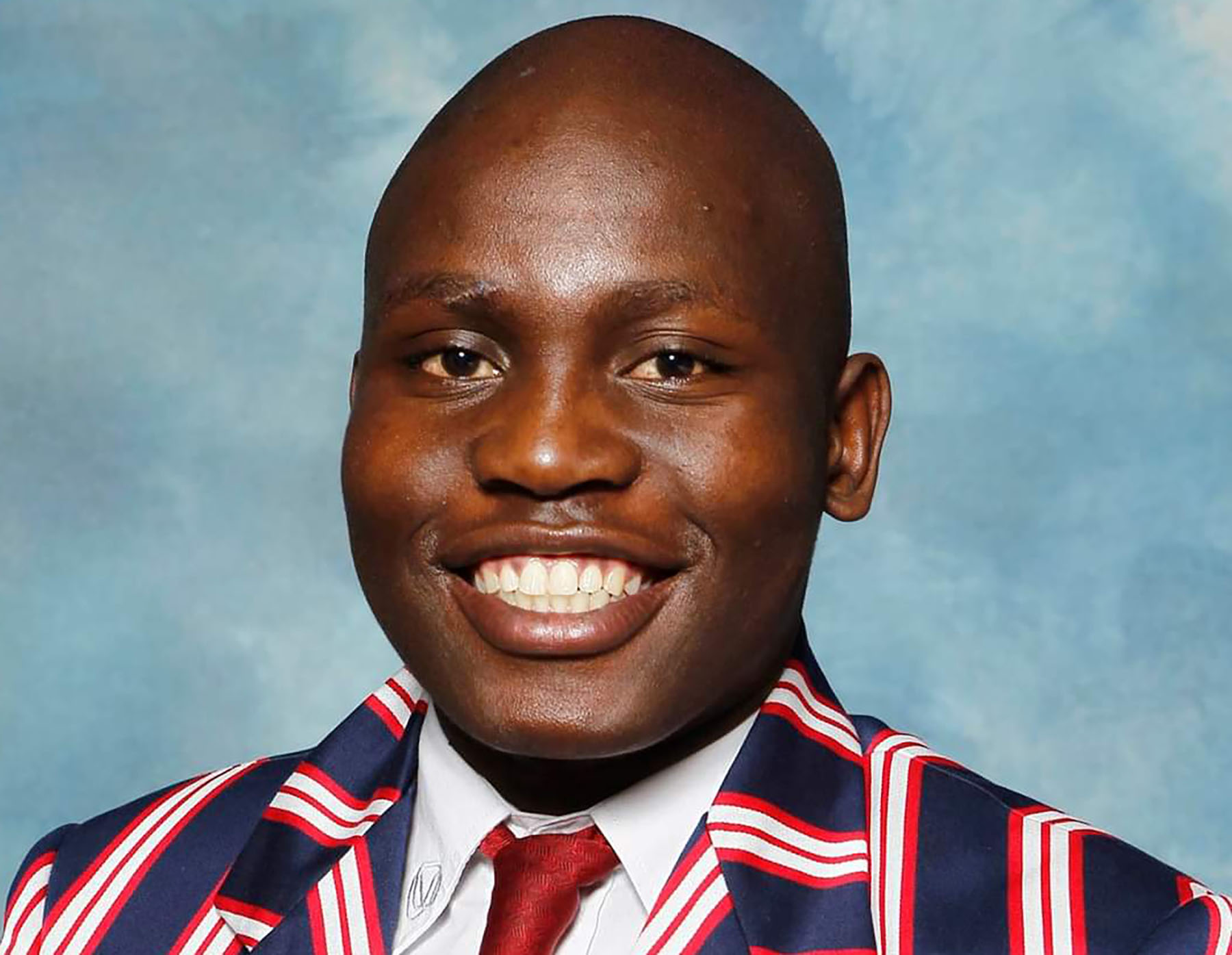
Katleho Lecho
Katleho Lechoo
Katleho Lechoo is lucky if he finds the time to eat amid attending protests, chairing meetings and fulfilling his academic duties.
But Lechoo, who speaks with a ringing, authoritative voice, says he won’t be deterred from his duties as the University of the Free State’s (UFS) SRC president, nor from his fight against financial and academic exclusion at the university.
Holding an undergraduate degree in political science and a postgraduate degree in theology from UFS, Lechoo served as an SRC sport officer before being elected as president late last year. The UFS’s SRC is politically affiliated with Sasco. The SRC makes decisions as a council but will sometimes consult Sasco structures in “really serious and complex matters”, according to Lechoo.
He believes student leaders hold the power to bring about progressive changes in higher education. It is not only about “striking” or “disrupting”; student leadership is about making an impact on people’s lives and fighting to ease student woes, he says.
“We need to be the change we want to see, [and] we need to play an active role in making that change possible,” he says.
The shutting down of universities is not a new phenomenon, with issues regarding registration and funding arising every year, he says.
Before him there was an array of student activists and leaders who fought to combat these issues and whose “resilience”, “strength” and “dedication” he draws on to guide his leadership.
He recalls being a first-year student at UFS in 2015, when the Fees Must Fall movement began. And describes how “heartbreaking” it was to watch students being arrested on national TV.
“I think what happened in 2015 serves as guidance – serves as practical evidence – that even though we fight the system, the system is going to fight back.”
Lechoo says the agenda of the previous generation of student leaders means “continuously calling for what they have been calling [for]”. Yet Lechoo believes a new strategy is needed, in order to propel the agenda forward – one imbued in unity.
He says that there is still a lot of division within the student bodies of various universities. “For us to make progress, we need to be united,” says Lechoo. “Anything [or anyone] that does not benefit the cause needs to be called out and condemned.”
This means the movement not only needs to confront and critique higher education institutions, but NSFAS and the Department of Higher Education and Training too, says Lechoo.
Covid-19 has exposed the cracks in higher education, with some universities failing to provide data and electronic devices to students, and many failing to provide adequate online learning, says Lechoo.
Ultimately, the pandemic exposed the “unpreparedness” of South African universities and exacerbated existing inequalities among students, he says.
At some point, student leaders noted that they needed to define this new era of protests, says Lechoo. It’s a starkly different era of mobilising, with a number of engagements happening online, then moving swiftly to university campuses. But it’s more important now than ever to keep fighting and building on the ideologies of previous student leaders, he says. DM168
This story first appeared in our weekly Daily Maverick 168 newspaper which is available for free to Pick n Pay Smart Shoppers at these Pick n Pay stores.

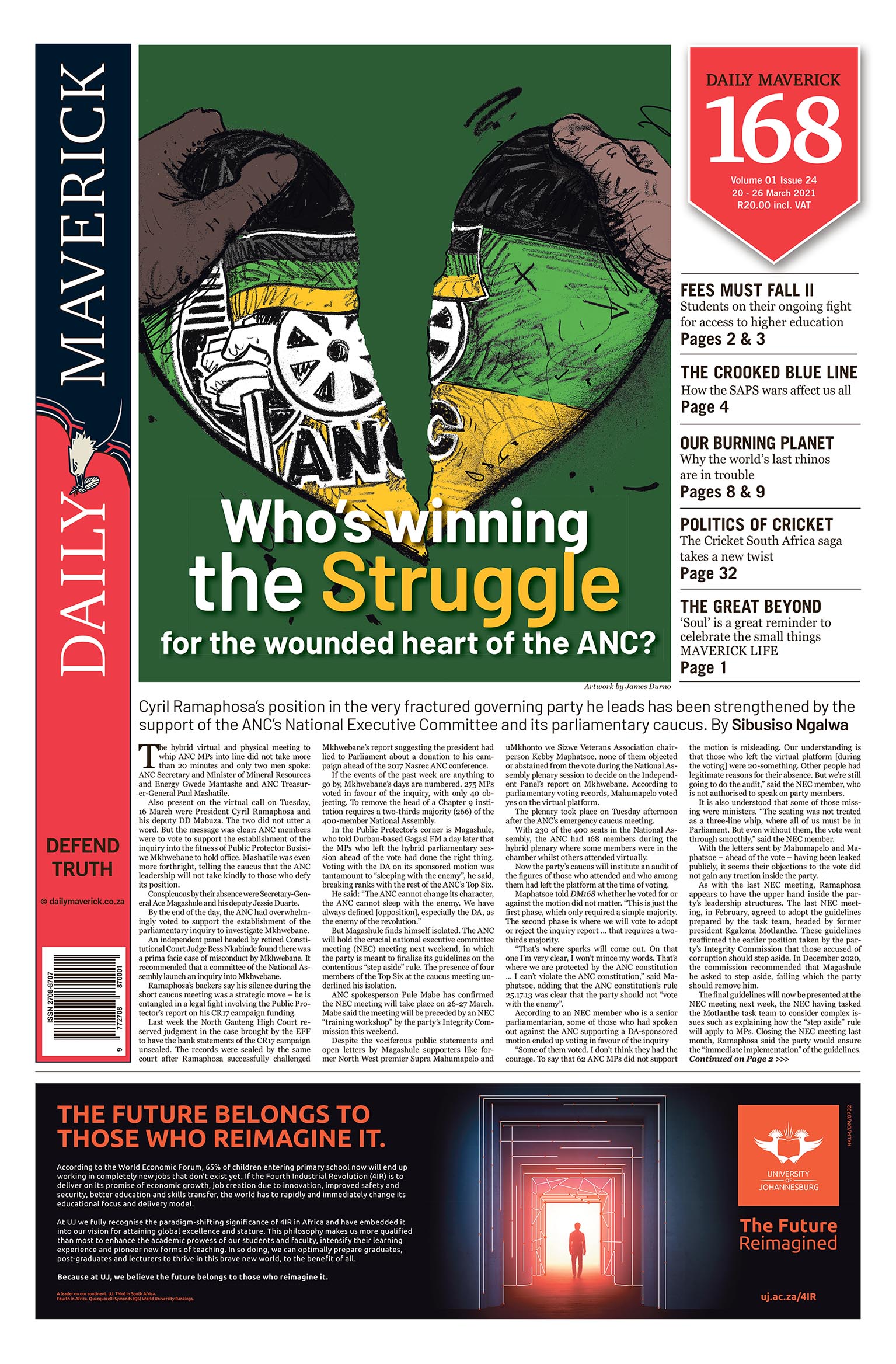
















 Become an Insider
Become an Insider
Do any students have a conscience? Do none understand, and take fully on board, that social transfer payments, welfare payments in our country are out of control and beyond levels that we, as a now lower-medium resourced country can afford, and that the choice is either pay the tertiary students, mostly studying for degrees that have no relevance to the future wealth of our country, or basic education or even pensions to the elderly. Government coffers are not an endless and bottomless pit, tax-payers in this country are grossly over-burdened, governments have no other sources of revenue, and quite frankly they are about the least deserving of the many calls on the public purse?
Very relevant observations, Jon. In some cases even the vice- chancellors are picketing. What kind of insightful leadership is that? No rational thinking now. What about rational thinking later when this generation has to take over the reigns?
Jonathan Jansen’s piece on the naked arrogance and absurdity of some of the fifteen demands of the protesting students in Vrye Weekblad is the perfect antidote to these hagiographies.
Free higher education is an ideal, but there are many greater priorities at present.
Our education system does not offer technical training, and the sciences (maths and physics) are regarded as “colonialist”. We have a heavy bias to arts and social studies in our universities – a nation of dancers and social workers. First fix the system, then talk about free education as an ideal.
May I set the record straight here – there is no FREE education. Somebody pays the cost thereof, and that somebody will be the 6% of the population that pays 98% of income tax. As Thatcher once said, the trouble with socialism is eventually you run out of other people’s money.
Even if I am a reasonable Matric student the chances of me finding a job are almost zero in the light of youth unemployment. My parents earn less than the minimum so I can apply to go to university where the government will pay all my costs for, with luck, up to five years. What should I do?
Dear Student. The world owes you nothing. Period.
To the student leaders: please stop calling it free education and call it what it is: tax funded education. And with our corrupt leaders stealing all the taxes, it will never happen.
Are universities not creative places where bright people provide great solutions to societies’ problems? The cumulative intellect of all researchers and Phd’s at 23 universities must be impressive. Or not. There is such a deafening silence among them that I realise that I was very naive about this.
So it is clear. Get free admission to university, become a student leader, get a useless degree in political science or suchlike, then get an un-elected job as an MP through being an ANC activist and let the taxpayer pay for your overpaid lifestyle while seeking opportunities to receive bribes.